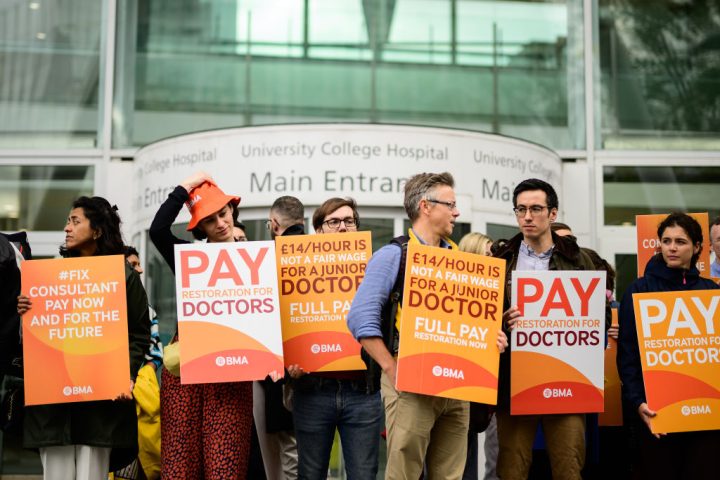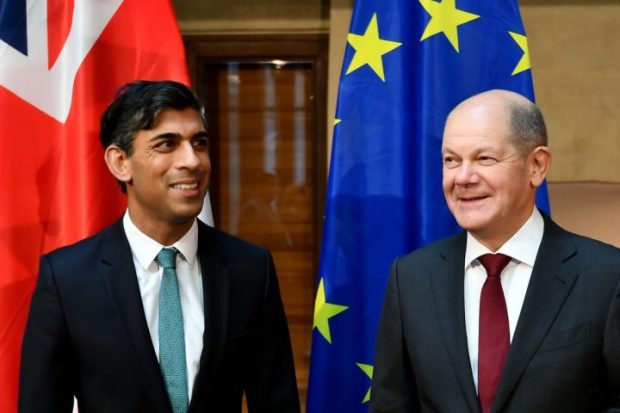What a fall from grace. Three years ago, the British Medical Association (BMA) could barely put a foot wrong. It could moralise over Tory failures – austerity, health inequalities, poverty, chronic underfunding of the NHS, mishandling of the pandemic – and even Tory politicians would quietly nod along. Its members were national heroes, even angels within the country’s national religion. And, importantly, most people believed the BMA was a medical body.
Now, people will be far more aware that the BMA is a militant trade union for doctors, representing their financial interests above the welfare of patients or the reputation of the institution they purport to protect. It wields enormous power, exploiting the NHS’s position as a monopoly to get all it can for its workers at the expense of the taxpayer. These workers add up to over 190,000 members and nearly 1,000 staff. Standard membership costs just over £39 per month.
Ideology, not the professed desire to protect the needs of patients and the NHS, is driving these strikes
Over the next two days, the BMA, along with other doctors’ unions, will inflict terrible damage on an NHS, which is already on the brink of collapse. Thousands of appointments and operations will be cancelled during the coordinated action, unprecedented in the NHS’s 75-year history, by junior doctors and consultants striking together. It is, in the words of NHS Confederation chief Matthew Taylor, ‘the nightmare scenario’.
The doctors’ unions maintain that the government’s refusal to negotiate on the basis of their 35 per cent pay claim is the principal blockage. In response to the latest offer recommended by the independent pay review body, the BMA’s chair Professor Phil Banfield accused the government of ‘making ordinary people sicker and poorer’ and said it ‘completely’ ignored the union’s calls to ‘value doctors… by full pay restoration to 2008/09 levels’.
They may be right that a 35 per cent pay rise would make up for 15 years of below-inflation wage increases, though the details of the comparison are obscure and they conveniently ignore the exceptionally generous pensions awarded to doctors. Yet in a time of economic uncertainty, stagnant productivity and low growth, their demands are unrealistic. And their argument that walkouts have thus far cost the NHS roughly the same amount it would have cost to meet the 35 per cent is spurious given industrial action is a one-off, and a permanent pay increase would form the basis on which all future claims would be made.
The BMA’s PR machine must have gone into overdrive last month when Dr Rob Laurenson, co-chair of its junior doctors committee, suggested in a BBC interview that the deal the union has backed from the Scottish government would not be accepted if put forward by Westminster. It seems that ideology, not the professed desire to protect the needs of patients and the NHS, is driving these strikes – and risking lives. The union has long struggled to untangle doctors’ financial self-interest from the duty of the profession to its patients, but rarely have these tensions been played out so publicly and in such a reckless manner.
In 1832, the BMA was founded to help doctors share scientific and medical knowledge during the cholera outbreak. A hundred years later, it had 100 branches, 250 divisions and a membership of 35,000. It vehemently opposed the creation of a new national health service in the 1940s, given its members’ discomfort at being directly employed by the state on set salaries, until Aneurin Bevan promised to stuff their mouths with gold.
Over the intervening period, those concerns have been turned on their head. The BMA has resisted many attempts at reform, typically shrieking about a secret plot to ‘privatise’ our ‘most cherished’ institution. Back in 2008, the union voted to restrict the number of medical student places in the UK, for fear of ‘over-supply’ which risked forcing down doctors’ generous salaries.
In 2012, the BMA rejected the Lansley reforms. Then, in 2021, it rejected the government’s Health and Care Bill, which mostly consisted of reversing those reforms. This year, it opposed shadow health secretary Wes Streeting’s suggestion that patients be able to refer themselves to NHS facilities without needing a GP to act as gatekeeper.
The BMA may claim to be acting in the NHS’s long-term interest, but complaints over working conditions only add to the inescapable feeling that our healthcare system is unfit for purpose. The pile of studies on its underperformance relative to systems in peer nations keeps growing. Demands for pay increases that will cost hundreds of millions a year, on top of the £168 billion we are pouring annually into the NHS England money pit, suggest something has gone terribly awry.
Public opinion matters: support can edge strikers towards victory – and hostility towards defeat. The more that the public look like sacrificial lambs in an ideological battle, the more their patience will wear thin. The BMA is destroying its own reputation – and the NHS’s with it.
Got something to add? Join the discussion and comment below.
Get 10 issues for just $10
Subscribe to The Spectator Australia today for the next 10 magazine issues, plus full online access, for just $10.




















Comments
Don't miss out
Join the conversation with other Spectator Australia readers. Subscribe to leave a comment.
SUBSCRIBEAlready a subscriber? Log in